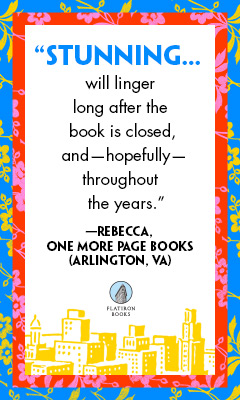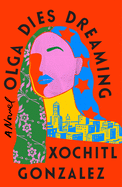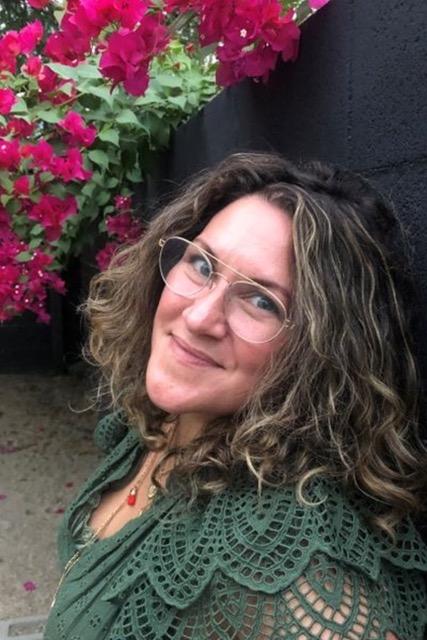Olga Dies Dreaming
by Xochitl Gonzalez
Xochitl Gonzalez's Olga Dies Dreaming is a scintillating, eye-opening story of family, legacies, and political and individual struggles, set in contemporary New York City and Puerto Rico. Readers will be entirely captured by Olga and her family, friends and associates as this spellbinding narrative twists, turns and unfolds over the years and miles. Gonzalez's stunning first novel feels far more expansive than its not-quite 400 pages.
Olga Isabel Acevedo, Brooklyn-born child of Puerto Rican parents, is an ambitious, status-conscious wedding planner to New York City's upper echelon. "Using a traditional American metric for measuring success," she is winning: she left the family home for a fancy New England college, has her own business and enjoys a certain amount of fame via glossy magazine and television appearances. She has a large, close-knit family still based in Brooklyn's Sunset Park, but with several holes in it: her loving and beloved father, once a proud political activist and member of the Young Lords, now dead from drug addiction and AIDS; her late grandmother who raised her; and most troublingly, Olga's mother, Blanca, a militant radical who left the family when Olga was not quite 13. "Achieving liberation will require sacrifice," Blanca wrote to her young daughter. Olga's involuntary sacrifice in service of Puerto Rican liberation was to give up her mother to the cause.
Crucially, Olga still has her older brother, Prieto, with whom she is very close. If Olga is a star as wedding planner to Manhattan's upper crust, Prieto is a supernova, the handsome, popular young congressman representing their neighborhood in Washington: "He wasn't quite code-switching so much as he managed, miraculously, to speak several languages simultaneously, creating a linguistic creole of hip-hop, academia, contemporary slang and high-level policy points that made Olga marvel.... Olga herself had never learned this linguistic mezcla that her brother had perfected; this ability to be all facets of herself at once. She always had to choose which Olga she would be in any given situation, in any given moment."
However well her career is going, Olga feels a void. Blanca writes to her frequently (via go-betweens, from an undisclosed location) to excoriate Olga for pursuing the meaningless, superficial goals of white society rather than working toward liberation for la raza. Prieto, apparently fighting the good fight (if only, their mother writes to him in turn, from inside a broken system), has his own demons and secrets as well.
The plot of Olga Dies Dreaming sees several delicate balances begin to upset. Olga's surface-level achievements show cracks as she questions what she's actually working toward. She meets a man she may truly like, which exposes a weakness: her people skills, so polished at work, don't hold up to a situation with real stakes. Prieto's carefully maintained façade falters, one of his secret insecurities threatened. When Puerto Rico is gutted by the one-two punch of Hurricanes Irma and then Maria, Olga takes a few hits herself. Can she navigate a romantic relationship? Will her brother withstand the latest storm in his private life--and is their bond up to the challenge? Perhaps most significantly: what does Olga have to gain--or lose--if her long-absent mother chooses these turbulent times to make a reappearance?
The masterful Olga Dies Dreaming roams far and wide, encompassing the most obnoxiously petty, overindulged weddings of the 1% and the dire straits of rural Puerto Ricans lacking clean drinking water, food or electricity. Such range could get unwieldy in less capable hands, but Gonzalez has a firm grasp of her plot threads. With lively, clever prose and adept political commentary, this novel asks questions about race and assimilation, about government corruption and capitalism, about gentrification and family duty. Olga, Prieto, their aunts and uncles and cousins, Olga's work associates, casual sexual partners and her new bae: likeable, appalling and everything in between, these characters sparkle with authentic detail. While this is Olga's story, the point of view does sometimes shift to offer Prieto's perspective and a few others. Readers (uncomfortably) get inside the head of a deeply unpleasant man of great privilege, for example--aptly named Dick--as well as that of our heroine. Gonzalez is also expert with setting, as her novel travels from the peculiarly organized hoarder apartment of Olga's love interest to an impressively high-tech rebel compound in the Puerto Rican jungle, an opulent Easthampton beach house and more.
From Blanca's mysterious and blistering missives come political and ideological rhetoric and intellectual challenges. Olga was named for Olga Garriga, activist for Puerto Rican nationalism, but also hanging over her is the story of Olga from poet Pedro Pietri's "Puerto Rican Obituary," who "died waiting dreaming and hating." These are the extreme options she's been offered: Blanca's rigid revolutionary ideal or the unattainable, swank American dream. Instead, in the end, Olga must chart her own path to a third option, one where she might finally find peace.
This novel positively glitters with truth, wit, humor, pathos, trauma, love and pain. Gonzalez's narrative operates with consummate skill on the level of the individual, the family and the political system. There is much to learn and ponder here about colonialism, corruption and policy. And on a more personal level, Olga casts a spell that will linger with readers long after these pages are closed. Olga Dies Dreaming is simply unforgettable. --Julia Kastner



.jpg)




